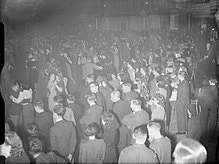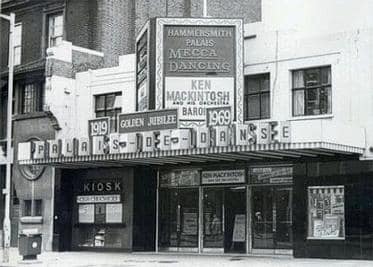My Uncle John’s WWII letters have opened up a whole world to me that I’ve never known. I’ve had the pleasure of learning about how dancing helped him get through the war years. Uncle John was stationed at an Army base in England during much of WWII and he loved dancing there! When it came time to relax he would check out his local dancing opportunities. There were regular dances being held on base or at various military clubs around. When he was on furlough he would take frequent trips to London. In minutes of arriving he could catch the subway (the tube) or hop on a bus and be almost anywhere. Because of his letters, I know that he got to visit one of the most famous dance halls in London.
On November 19, 1942, he wrote:
“Thursday I went to a Charity Ball. It was a dreary night, one of those famous wet and foggy English nights and people were a little slow attending the affair. ”
On February 27, 1943, he wrote:
“Saturday I went to my usual dance since I can stay out until 12:30. Was the same orchestra I heard last Saturday. I didn’t stay to the end but 12:00 o’clock found me already in bed. This morning we had to take a good deal of care in making our beds, cleaning the hut, and the surrounding (area) as the general himself was on an inspection tour. Ours came out quite well.”
On March 14, 1943, he wrote:
“Saturday evening I went to a dance; somehow or other my round of good girl dancers is vanishing gradually; some have gone into the armed forces while others have defense jobs many miles away. I danced with one who was from Australia and now in service of the WAAF’s. (My notes: Women’s Auxiliary Air Force) All in all, it was a fair evening although I did have better times than this one, many a time.”
On September 6, 1943, he wrote:
“It was the most important week of my career–and the major rewarded me in praise for my effort—gave me a day and a half off this week—Tuesday noon to Thursday morning. Going to London–take in a few shows and then maybe a dance.”
On October 8, 1943 he wrote:
“Had an enjoyable time on my leave–saw a movie in the afternoon……..Then in the evening I spent my time dancing at the Hammersmith. I’m getting to be an old timer there–and I can truthfully say there are some good dancers there.”
Uncle John got to dance at Hammersmith Palais! For many years, it was Europe’s most famous ballroom dance hall located in West London. The name of the city was Hammersmith and then “Palais” meant palace. The ballroom was in operation from 1919 to 2007. The hall filled an enormous space and was built on the site of a former tram depot. Throughout the years, the hall promoted artists and talents that led the new way in jazz music. 2,500 people could sit inside or 5,000 could dance at one time! Its beautiful maple dance floor cost 5,000 pounds or about $7,000- $8,000 US dollars to install. If that price was adjusted for inflation that would be a small fortune today spent on flooring!
The doors to Hammersmith Palais stayed open even when London was consistently bombed by the German artillery from late 1940 to mid-1941. During the Blitz of London they had ten straight weeks of bombing followed by five months of sporadic bomb attacks. Surprisingly many clubs stayed open. When Brits were dancing they were a happy community showing their fortitude and endurance.
Big band Sounds were popular during the war. I wonder what Uncle John heard. Did he dance to Tommy Dorsey’s “Boogie Woogie”? Did he listen to Benny Goodman’s “Taking a Chance on Love”? Archived photos have shown soldiers standing and dancing in Hammersmith Palais with barely any room to breathe. They were shoulder to shoulder! Besides the dance floor there was a huge revolving stage on which bands could play on either side.
Sadly this important part of Britain’s culture and history declined by the late 1980s. In 2007, the building was condemned and was then demolished in 2021. Today the site of the dance hall is a student accommodation building. Not much remains of the glamorous past. But if you look closely there is a plaque commemorating Hammersmith Palais and its importance to British people.


